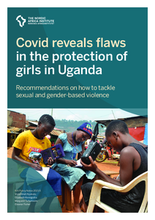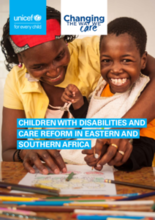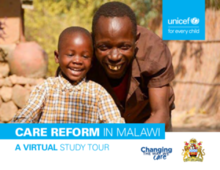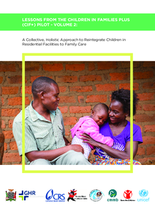Displaying 281 - 290 of 1622
7.5 million children all over the world live in charitable children’s institutions, commonly known as children’s homes or orphanages, yet 80 per cent to 90 per cent of these children have a living parent or known relatives. In Kenya, an estimated 45,000 children live in charitable children’s institutions for various reasons such as the loss of a parent or primary caregiver, poverty at home, sickness and disability, violence, abuse, and neglect.
When parents pass away, grandparents often assume the role of caregivers. Being thrust back into parenthood during a time of immense grief, and with a two-generation gap to bridge, introduces a range of challenges grandparents must overcome. This video look at the learning of practitioners from Upendo Village in Kenya in supporting grandparents caring for grandchildren after their own children have passed away from HIV/AIDs.
The purpose of this event series is to bring care experienced people and supporters from all over the world together to connect, expand and create new ideas for change. The Uganda Care Leavers Organisation (UCL) will lead this presentation.
Overtime, and after realising the full cost of running even a small residential program, and witnessing first-hand the developmental gains made by children once placed in foster care, Child’s i Foundation made a decision to fully transition and phase out their residential care program entirely.
Through 2020 and 2021, the COVID-19 pandemic led to prolonged school closures in Uganda. These closures exacerbated sexual and gender-based violence (SGBV) against girls.
Nearly 200 young children have died of starvation in hospitals across Ethiopia’s Tigray region as malnutrition soars one year after a brutal conflict broke out, according to data collected by local doctors and researchers.
Jeanne Uwamariya's firstborn Gloria Abijuru was born with a physical disability. The father to her children with whom they were not legally married abandoned his family when Abijuru was just 3 years old.
This paper highlights the importance of placing support for children with disabilities and their families at the centre of care reform efforts, and provides examples from across the region of how this can be done.
This virtual study tour aims to provide you with an overview of care reform in Malawi from the comfort of your own home. Care reform relates to the care of children. It refers to efforts to improve the legal and policy frameworks, structures, services, supports and resources that determine and deliver alternative care, prevent family separation and support families to care for children well.
Building on the CIF+ Learning Brief Vol 1.pdf, Volume 2 draws from CIF+ partner programming experience, achievements and lessons learned. This document outlines lessons for stakeholders that are interested in child reintegration efforts and highlights examples of the pilot as it works to support children and families in Zambia.





